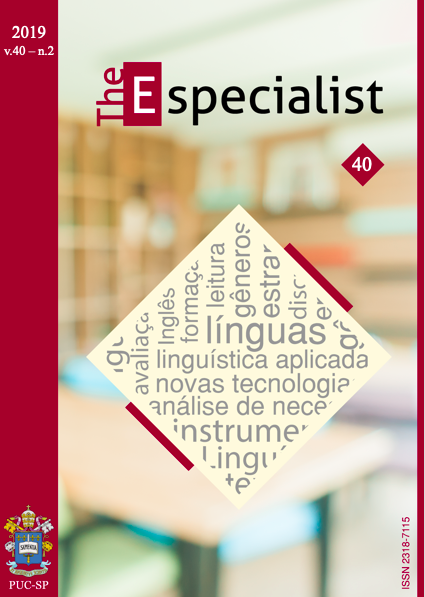Inglês como língua franca: explicações e implicações
DOI :
https://doi.org/10.23925/2318-7115.2019v40i2a2Mots-clés :
Inglês, Língua Franca, Ensino, AprendizagemRésumé
O Inglês como Língua Franca (ILF) tem como foco a comunicação em diferentes contextos e é um campo de pesquisa que nos ajuda a refletir sobre a posição que a língua inglesa ocupa no globo e como nós, do círculo em expansão (KACHRU, 1982, 1992), devemos nos posicionar em relação a ela. Nosso objetivo aqui refletir, com base em uma pesquisa bibliográfica e qualitativa, sobre a Língua Franca, o conceito, seu surgimento e as implicações no ensino e na aprendizagem da língua inglesa, com base em estudiosos da área. Concluímos, pois, que o ILF nos traz uma pedagogia que pressupõe uma prática preocupada em se reposicionar diante de visões monolíticas e monológicas e, assim sendo, a língua inglesa passa a ter identidades multiculturais e características locais, propondo um movimento de ruptura diante de um discurso de língua que perpetue desigualdades.
Références
BAUMGARDNER, R. J. 2006. Teaching world Englishes. In: KACHRU, Braj et al. (Org.) The handbook of World Englishes. Oxford: Blackwell Publishing. pp. 661-679.
BRASIL. 2018. Ministério da Educação. Base Nacional Comum Curricular. Brasília: MEC.
BYRAM, M; HU, A. (Ed.). 2013. Routledge Encyclopedia of Language teaching and learning. 2a. ed. London: Routledge.
CANAGARAJAH, S. 2013. Translingual practice: global Englishes and Cosmopolitan relations. New York, NY: Routledge.
COGO, A. 2015. English as a Lingua Franca: Descriptions, Domains and Applications. In: BOWLES, H.; COGO, A. 2015. International perspectives on English as a lingua franca: pedagogical insights. London: Macmillan.
COGO, A.; PITZL, M. L. 2014. ELF Ren. ELF, [S.l.]. Disponível em: http://www.english-lingua-franca.org/about/elf-ren. Acesso em: 25 jun. 2017.
CRYSTAL, D. 2003. English as a global language. New York: Cambridge University Press.
CRYSTAL, D. 2008. Two thousand million? English Today, [S.l.], 24.1: 3-6.
EL KADRI, M. 2010. Inglês como língua franca: um olhar sobre programas disciplinare de um curso de formação inicial de professores de inglês. Entretextos, Londrina, 10.2: 64-91.
FIELD, J. 2003. The fuzzy notion of ‘intelligibility’: a headache for pronunciation teachers and oral testers. IATEFL Special Interest Groups Newsletter.
FIELD, J. 2005. Intelligibility and the listener: the role of lexical stress. TESOL Quarterly, 39: 399-423.
FRIEDRICH, P.; MATSUDA, A. 2010. When Five Words Are Not Enough: a conceptual and terminological discussion of English as a lingua franca. International Multilingual Research Journal, v. 4, n. 1, p. 20-30.
GIMENEZ, T. 2015. et al. Inglês como língua franca: desenvolvimentos recentes. RBLA, 15.3: 593-619. Belo Horizonte.
GRABE, William. 2010. Applied Linguistics: a twenty-first-century discipline. In: KAPLAN, R. B. 2010. The Oxford Handbook of Applied Linguistics. 2a. ed. Oxford University Press.
JENKINS, J. 1998. Which pronunciation norms and model for English as an International Language. ELT journal, 52.2: 119-126. Oxford University Press
JENKINS, J. 2000. The Phonology of English as an International Language. Oxford: Oxford University Press.
JENKINS, J. 2009. English as a lingua franca: interpretations and attitudes. World Englishes, 28.2: 200–207.
JENKINS, J. 2015. Repositioning English and multilingualism in English as a Lingua Franca. Englishes in Practice, 2.3:49-85.
JENKINS, J. 2016a. Review of International Perspectives on English as a Lingua Franca: pedagogical insights, by H. Bowles and A. Cogo (Ed.). ELT Journal, pp. 1-16.
JENKINS, J. 2016b. An introduction to English as a Lingua Franca: ELFpron speaks to Professor Jennifer Jenkins. 6’16”. Youtube, [S.l.], 20 dez 2016. Disponível em: https://www.youtube.com/watch?v=ZvWCqvxK9Hg. Acesso em: 19 abr. 2018.
JENKINS, J.; COGO, A.; DEWEY, M. 2011. Review of developments in research into English as a lingua franca. Language Teaching, 44.3: 281-315. Cambridge University Press.
KACHRU, B. B. (Ed.). 1982. The other tongue: English across cultures. Urbana, IL: University of Illinois Press,
KACHRU, B. B. 1992. World Englishes: Approaches, issues and resources. Language Teaching, 25: 1-14. [S.l.].
LEFFA, V. J. 2002. Teaching English as a multinational language. The Linguistic Association of Korea Journal, 10.1: 29-53. Seoul, Korea.
MEIERKORD, C. 2013. English as a Lingua Franca. In: CHAPELLE, C. A. (Ed.). 2013. The encyclopedia of Applied Linguistics. Blackwell Publishing Ltd.
RAJAGOPALAN, K. 2003. Por uma linguística crítica: linguagem, identidade e a questão ética. São Paulo: Parábola Editorial.
ROCHA, C. H.; MACIEL, R. F. 2015. Ensino de língua estrangeira como prática translíngue: articulações com teorizações bakhtiniana. D.E.L.T.A., 31.2: 411-445. São Paulo.
SARWAL, A. 2007. Principles and methodologies of a global language teaching program – a proposal. In: KASSABGY, N.; ELSHIMI, A. 2007. Sustaining Excellence in ‘communication across the Curriculum’: Cross-Institutional Experiences and Best Practises. UK: Cambridge Scholars Publising. pp. 128-146.
SCHUMACHER, C.; WHITE, P.; ZANETTINI, M. 2002. Guia de pronúncia do inglês para brasileiros: soluções práticas para falar com clareza. Rio de Janeiro: Campus.
SEIDLHOFER, B. 2001. Closing a conceptual gap: the case for a description of English as a Lingua Franca. International Journal of Applied Linguistics, 11.2: 133-158.
SEIDLHOFER, B. 2004. Research perspectives on teaching English as a lingua franca. Annual Review of Applied Linguistics, 24: 209–239. USA, Cambridge: Cambridge University Press.
SEIDLHOFER, B. 2005. English as a lingua franca. ELT Journal, 59.4: 339-341. Oxford University Press.
SEIDLHOFER, B. 2011. Understanding English as a Lingua Franca. Oxford: Oxford University Press.
SMITH, L. E. 1992. Spread of English and issues of intelligibility. In: KACHRU, B. B. (Ed.). 1992. The other tongue: English across cultures Urbana: University of Illinois Press. pp. 27-47.
TIMMIS, I. 2002. Native-speaker norms and International English: a classroom view. ELT Journal, 56.3: 240-249. Oxford University Press.
UNESCO. 1953. The use of vernacular languages in education. Monographs on fundamental education – VIII. Paris: UNESCO.
Téléchargements
Publiée
Comment citer
Numéro
Rubrique
Licence
The authors grant the journal all copyrights relating to the published works. The concepts issued in signed articles are the absolute and exclusive responsibility of their authors.


 Esta obra está licenciada com uma Licença
Esta obra está licenciada com uma Licença 